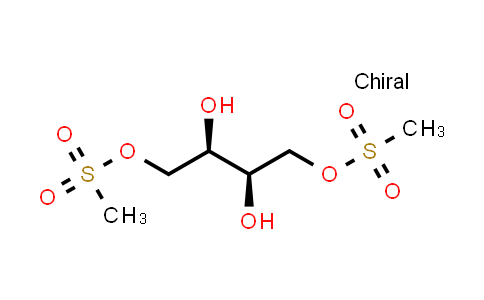Introduction of 299-75-2 :
Treosulfan (NSC 39069) is a bifunctional alkylating agent with activity in ovarian cancer and other solid tumor types. IC50 & Target: DNA Alkylator[1] In Vitro: Treosulfan is an alkylating agent. Treosulfan inhibits several cancer cell lines, such as Panc-1, Miapaca-2 and Capan-2 cells, with IC50s of 3.6 μg/mL, 1.8 μg/mL and 2.1 μg/mL respectively, and shows nearly 100% cytotoxicity on these cell lines at 100 μg/mL. Treosulfan (0.1-100 μg/mL) in combination with LY 188011 exhibits enhanced activity against cancer cells. However, Treosulfan (1, 2.5, 5 μg/ml) combined with 5-FU (0.1, 0.25, 0.5 μg/ml) has antagonistic effect on Panc-1 cells at intermediate and high concentrations, and on Miapaca-2 cells at all doses[1]. Treosulfan (800 µg/mL) dramatically reduces erythrocyte forward scatter, increases the percentage of annexin-V-binding cells, [Ca2+]i, and ROS. Removal of extracellular Ca2+ abrogates the effect of Treosulfan on annexin-V-binding[2]. In Vivo: Treosulfan (1.5 g/kg/day) induces a rapid myeloablation, depletes the splenic B and T cells in mice. Treosulfan (1.5 g/kg/day) causes olny interleukin-2 production in spleen cells for a short time and without obvious significant effect on synthesis of tumor necrosis factor-α and/or IFN-γ in mice[3].
